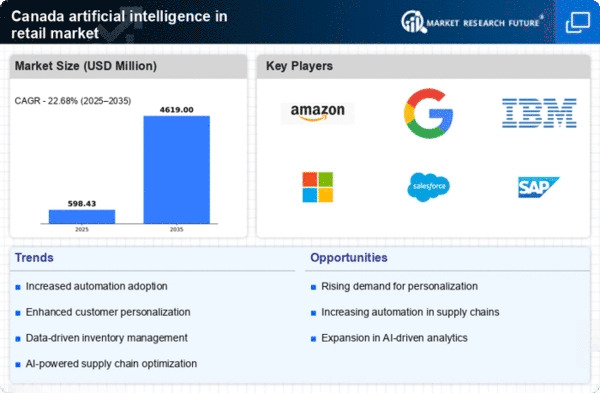Data-Driven Decision Making
The increasing availability of data is significantly influencing the artificial intelligence-in-retail market. Retailers in Canada are leveraging vast amounts of consumer data to make informed decisions regarding inventory management, pricing strategies, and marketing campaigns. The ability to analyze customer behavior and preferences allows retailers to tailor their offerings, enhancing customer satisfaction and loyalty. Reports suggest that data-driven strategies can lead to a 20% increase in sales for retailers who effectively utilize AI analytics. This trend underscores the importance of data in shaping retail strategies and highlights the potential for AI to transform decision-making processes. As retailers continue to harness data, the artificial intelligence-in-retail market is expected to expand, driven by the demand for more sophisticated analytical tools and insights.
Enhanced Operational Efficiency
Operational efficiency remains a crucial driver for the artificial intelligence-in-retail market. Canadian retailers are increasingly adopting AI technologies to optimize various aspects of their operations, from supply chain management to customer service. By automating routine tasks and utilizing predictive analytics, retailers can reduce costs and improve service delivery. For example, AI algorithms can forecast demand more accurately, enabling better inventory management and reducing waste. A study indicates that AI implementation can lead to a 30% reduction in operational costs for retailers. This efficiency not only enhances profitability but also allows retailers to allocate resources more effectively, thereby fostering growth in the artificial intelligence-in-retail market. As competition intensifies, the drive for operational excellence through AI will likely become even more pronounced.
Technological Advancements in AI
The rapid evolution of technology is a primary driver for the artificial intelligence-in-retail market. In Canada, advancements in machine learning, natural language processing, and computer vision are enabling retailers to enhance customer experiences and streamline operations. For instance, AI-driven chatbots and virtual assistants are becoming commonplace, providing 24/7 customer support and personalized recommendations. According to recent data, the Canadian retail sector is projected to invest approximately $1.5 billion in AI technologies by 2026, indicating a strong commitment to integrating AI solutions. This investment is likely to foster innovation and improve operational efficiency, thereby propelling the growth of the artificial intelligence-in-retail market. As retailers adopt these technologies, they can expect to see improved customer satisfaction and increased sales, further solidifying the role of AI in the retail landscape.
Consumer Demand for Personalization
The growing consumer expectation for personalized shopping experiences is a significant driver of the artificial intelligence-in-retail market. Canadian consumers increasingly seek tailored recommendations and customized interactions, prompting retailers to adopt AI solutions that cater to these preferences. AI technologies enable retailers to analyze customer data and deliver personalized marketing messages, product suggestions, and promotions. Research indicates that 80% of consumers are more likely to make a purchase when offered personalized experiences. This trend compels retailers to invest in AI capabilities that enhance customer engagement and satisfaction. As the demand for personalization continues to rise, the artificial intelligence-in-retail market is poised for growth, driven by the need to meet evolving consumer expectations.
Competitive Pressure and Market Dynamics
The competitive landscape in the retail sector is a driving force behind the growth of the artificial intelligence-in-retail market. As retailers strive to differentiate themselves, the adoption of AI technologies becomes essential for maintaining a competitive edge. In Canada, companies are increasingly recognizing the need to innovate and enhance their service offerings to attract and retain customers. The pressure to improve operational efficiency, customer engagement, and overall performance is pushing retailers to explore AI solutions. A survey indicates that 70% of Canadian retailers believe that AI will be a key factor in their competitive strategy over the next five years. This competitive pressure is likely to accelerate the adoption of AI technologies, further propelling the artificial intelligence-in-retail market.
















